As you know, I am “The Barefoot Backpacker“, and I travel around the world. As you may have spotted, I have an asexual pride flag sewn onto my backpack. Although these are two very separate parts of my life, I am consciously aware there is an overlap. Being an asexual into travel gives an unusual and unexpected perspective and set of challenges, that may not be what people imagine.
Is Asexual Travel different to Gay/Queer Travel?
There’s two main differences between asexual travel and LGBTQI+ travel. One is, as far as Queer rep and stereotype is concerned, we travel to different places and for different reasons. The other is a very different aspect to safety when travelling. The two strongly overlap.
I have noticed something about LGBTQI+ travel bloggers, especially when I browse my travel twitter feed. It’s notable not only just how many people identify as gay and lesbian, but also how much they take that aspect of themselves and make it a core part of their travel writing and blogging. It’s not just “I’ve been to this place, oh by the way I’m gay”, it is very much “Barcelona as a Gay Traveller”, or “Things To Do In Berlin For Lesbians”. They also commonly post about safety and politics: “How To Travel Safely As A Lesbian”, “Places For LGBT Travellers To Avoid”, “Things To Be Aware Of If You’re Gay”. There are even specific blog awards in the LGBT community, including things like ‘best travel blog’.
Yet. With regards to asexuality in the travel community, there are no awards for ‘Best Asexual Travel Blog’. There is, as far as I can tell, no-one writing about “Safety in Asexual Travel”, or “Best Places To Be Asexual”. It’s almost as if Asexuality doesn’t exist as a separate entity, almost as if asexuals themselves don’t matter.
It took me about two seconds to realise why.
See, Gay Travel is blindingly obvious when it happens. Whilst even friends are more than likely to hold hands in the street, when you’re on a free walking tour and see two people give each other a quick peck on the cheek, it’s a bit of a giveaway. Then of course there’s the whole issue of two people of the same sex sharing a room. There’s quite a few countries where that’s illegal, at least without proof of familial blood.
This means that much of Queer Travel is geared towards places where people feel safe and comfortable, so often to places with a large community of other Queer people. Queer Travel thus lends itself well to city breaks in The Global North (West), and often to places with a social party scene too. This is more an aspect of Queer community than Queer travel – the stereotype is that we in the Rainbow Acronym ‘Party Hard’, often with a sexual component. Gay bars are often loud and serve as clubs after hours, and ‘the Gay Scene’ is very much ‘eating, drinking, cavorting’. Maybe this is also partly ‘safety in numbers’.
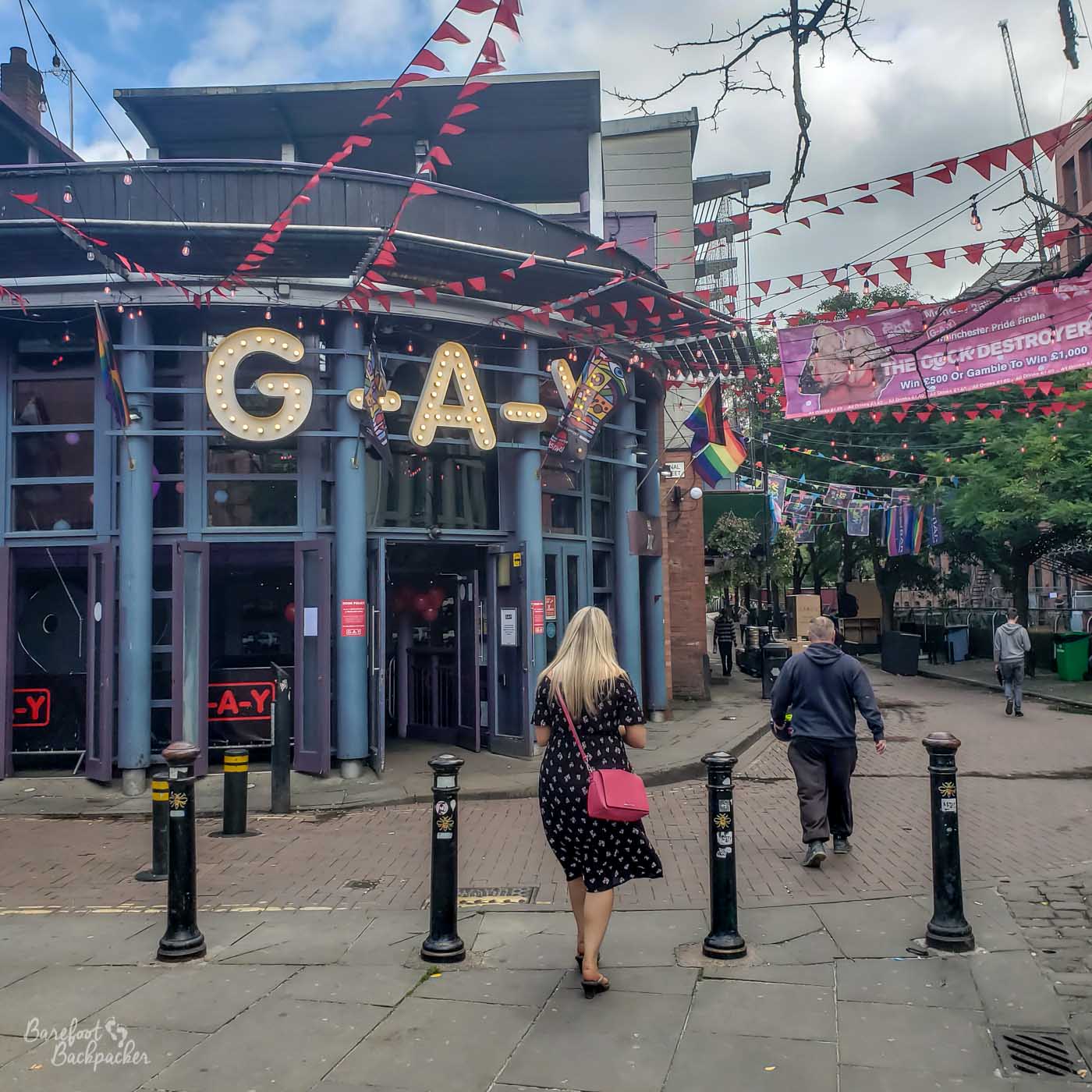
G-A-Y bar in Manchester, during Manchester Pride week.
Asexual travel feels different. Now, I don’t know how much of the way I travel differently is because of my asexuality, and how much is clouded by my introversion, but while asexuals can and do party, can and do have sex, etc, I’ve never really imagined asexual clubs or bars. So we as asexuals may tend to travel to places based more on our interests than our sexuality.
It also means that a travel blog that concentrated on asexuality would be quite … dull. Going to any city as an asexual to do asexual things doesn’t feel any different from going to a city as a standard tourist and doing standard touristy things; there’s nothing I can do as an asexual that would be different. There are no asexual-friendly or -unfriendly hotels, there are no asexual bars where asexuals can go to not hook-up, there’s no specifically asexual entertainment.
This then opens up a follow-up question.
Is Asexual Travel easier than Gay/Queer Travel? Is there anywhere asexuals can’t travel to safely?
The issues asexuals find when they travel are different to those of the rest of the Queer community, but that doesn’t mean they’re easier to dismiss.
However, let’s address the obvious point first. Gay, Lesbian, and Trans travellers are usually more conspicuous by their presence. If Brent and Michael walk down the street, it’ll be clear that they’re more than just travel buddies, unless they actively take steps to appear otherwise. Every time Katelyn goes through an airport, they’re wary of the security scanners and being led aside because they don’t pick up what they’re expected to. There’s a great deal of fear amongst Queer travellers, and invariably with good reason; we will be noticed, identified, highlighted, and picked on.
In general, it’s slightly different for the average asexual traveller. No-one can tell I’m asexual just by looking at me. I can’t be discriminated against by the way I look/dress/behave as I don’t ‘appear’ any different to any other ‘normal’ (to coin a phrase) traveller. I can’t be discriminated against for my beliefs since, in a sense there’s nothing to discriminate against. You don’t get asexuals appearing to flaunt their sexuality openly in the street – well, in fact you do, but no-one notices because … there’s nothing to notice.
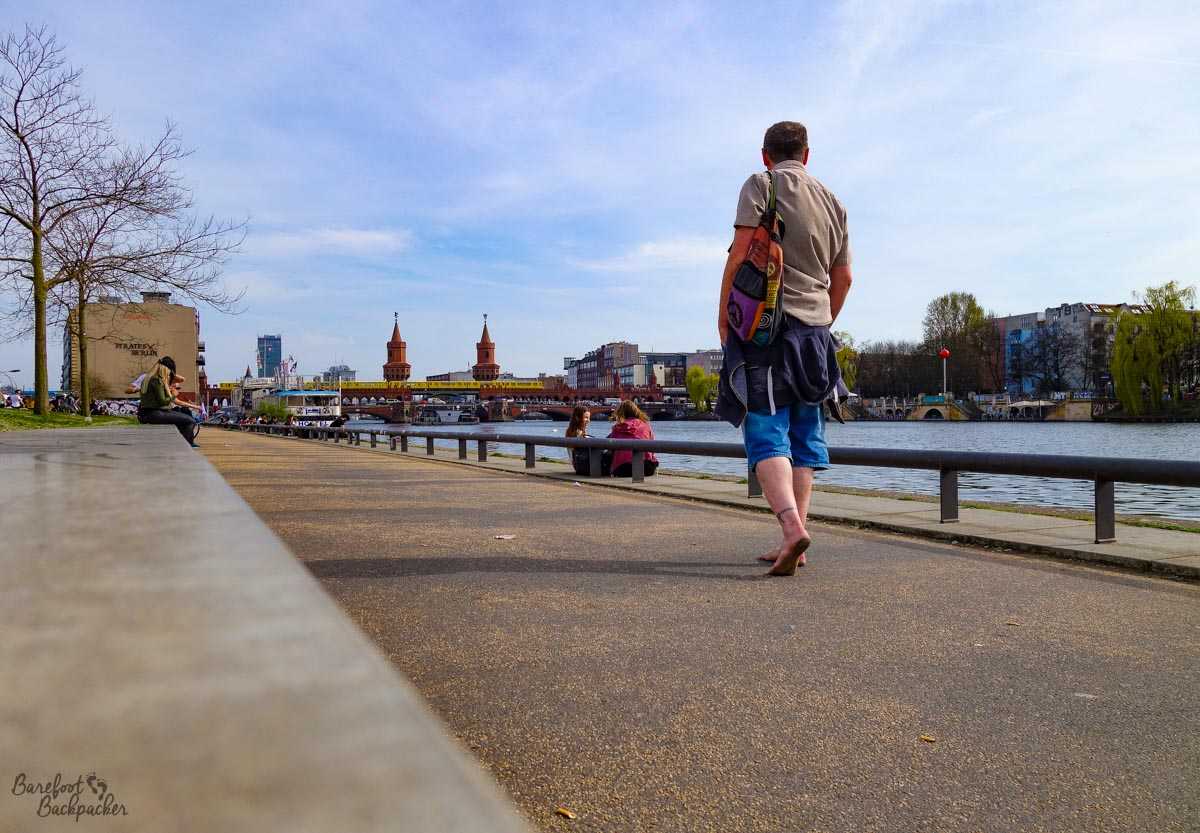
Asexual traveller in Berlin, not appearing any different to a standard solo traveller. Well, at least not in that way.
The other aspect for me, personally, is I generally always travel solo. This isn’t because I’m asexual, but it does reinforce my ‘you can’t tell’ vibes. In a way I’m ‘practising’ my asexuality just by being there, but no-one sees the difference, if indeed there is a difference for most people.
This means that on the face of it, asexual travel appears quite easy, when compared with other Queer travellers. There are no issues with safety whilst travelling since, as far as I’m aware, being asexual doesn’t break laws in any country. You can’t legislate against ‘practising asexuality’ since, well, what does that mean exactly anyway? How do you be actively asexual? You can’t, logically, ban ‘not’ doing something (and how would you prove it anyway?!). “Oh, you didn’t sleep with anyone last night; that’s a fine of £200 and 14 nights in jail … oh wait, that’s what you want, isn’t it? To not sleep with someone. Damn….”.
It’s very hard to prove that something doesn’t exist. In philosophical terms it’s a case of ‘evidence of absence’; I can’t ‘prove’ I’m asexual any more than I can prove I’m an only child – “oh look, let me introduce you to my non-existent sister’. I look like a solo male traveller, I act like a solo male traveller … To all intents and purposes, I presume everyone assumes I’m straight since I’m ‘not obviously anything else’. Obviously this is clouded by people not knowing that asexuality exists; in my entire time with the flag on my backpack, I’ve only ever been asked about it once.
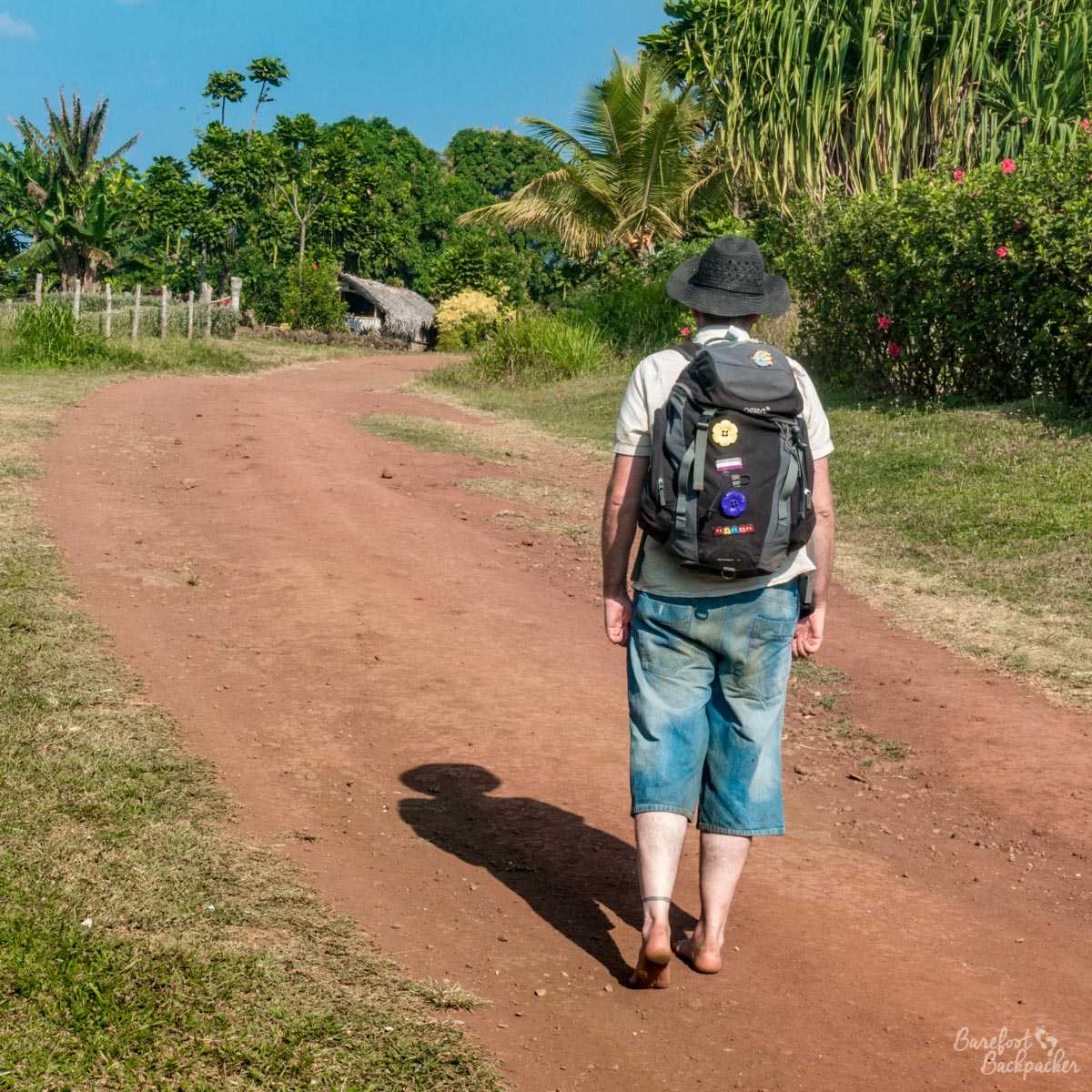
You can just see the asexual flag below the large yellow daisy.
On a more general view, there’s a whole question to be asked about ‘is it right to visit countries with a restrictive view of LGBTQI+ lifestyles’, especially as an asexual as I fall within the acronym. Should I avoid certain countries (Uganda, Russia, etc) because although they’re not repressive to me, they are incredibly so to people in the broader ‘queer’ community, and I should be expressing a kind of solidarity? Conversely, there’s the argument that boycotts never change anything, and that by not going you’re actively hurting the locals in such countries, the majority of whom may well not support the actions of the governments anyway. And, by being less likely to be hassled for my orientation, I’m in a much better position to talk about these places to people who can’t go.
However, we as asexuals do get hassled in other ways.
What are the challenges in travelling as an asexual? Is Asexual Travel difficult?
The main problems I’ve encountered through my asexuality have been cultural ones, similar to those many solo travellers face. The difference is in how I have to answer them.
For instance, in Central Asia I was travelling alone on many long-distance buses and one overnight train. Being the obvious foreigner, I attracted quite a crowd of interested locals. And they all tended to ask the same questions: ‘how old are you?’, ‘where are you from?’, and ‘where is your wife; why is she not with you?’. In many cultures, the concept of a solo traveller, especially one of my age, is unusual and opens up lots of questions.
If I were a cishet man travelling solo, the answer to that question is easy: ‘I’ve not found the right woman yet’ or something to that effect. As a asexual who presents as male, it’s sometimes easier to answer the same way. Culturally, even the concept of actively wanting to be alone is confusing for many people. So never mind trying to explain the lack of sexual attraction and the preference for platonic relationships over sexual and romantic ones. Especially when there’s a language barrier. Sometimes it’s just easier to hide my own identity, although it pains me to do so.
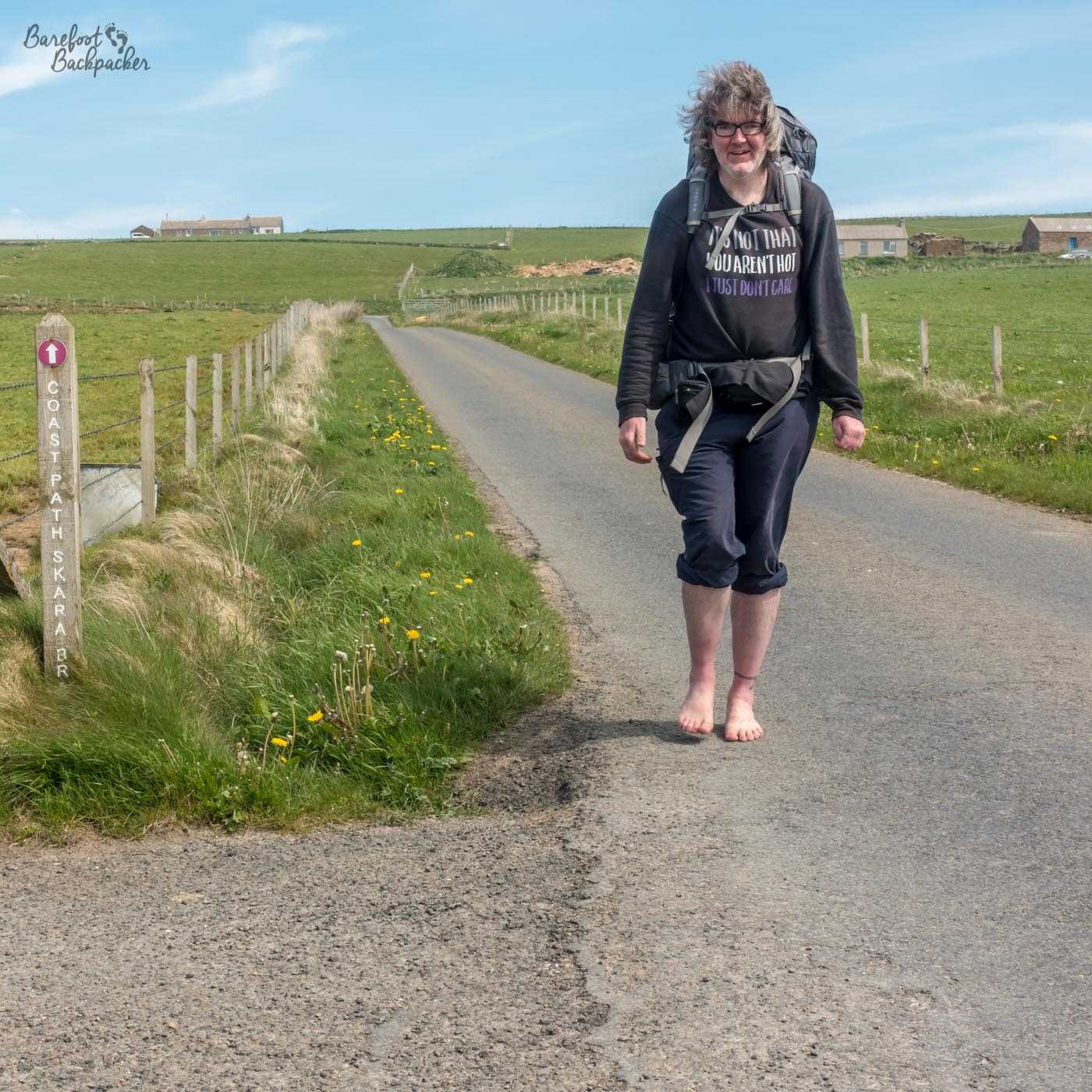
I wasn’t hiding my asexuality on Orkney, but only one person recognised the sentiment.
I personally don’t consider the questions I get asked to be rarely outwardly malicious (and that may be my male privilege speaking), but certainly asexuality sounds weird in a culture where anything other than heterosexuality, and proven heterosexuality at a younger age than me, is ‘the norm’.
That said, people do sometimes assume I’m homosexual. It is true I often give over ‘camp’ vibes – the canteen staff where I used to work said I reminded them of Kenny Everett. And in an allosexual world, my seeming shunning of relationships with women makes people suspect I’m just trying to hide my preference for men.
The way I present myself may also feed this view, especially more recently when I’ve been tending towards more gender-neutral clothing. Covid has prevented me truly travelling as non-binary so I’ve not had those experiences yet, but certainly my fashion has always been ‘less than expected masculine norms’.
Take, for example, my toenail varnish, which more traditional elements may find ‘effeminate’ and so give a certain impression of me. Even if my friend V suggests that’s only a minor aspect of me, it’s still something that’s noticeable. When I was in Benin, my guide at Ouidah wondered if my painted toenails meant I was gay. In Chile, three people walked past me as I was waiting for something to open, looked at my feet, laughed, and walked off. I had no real answer to that.
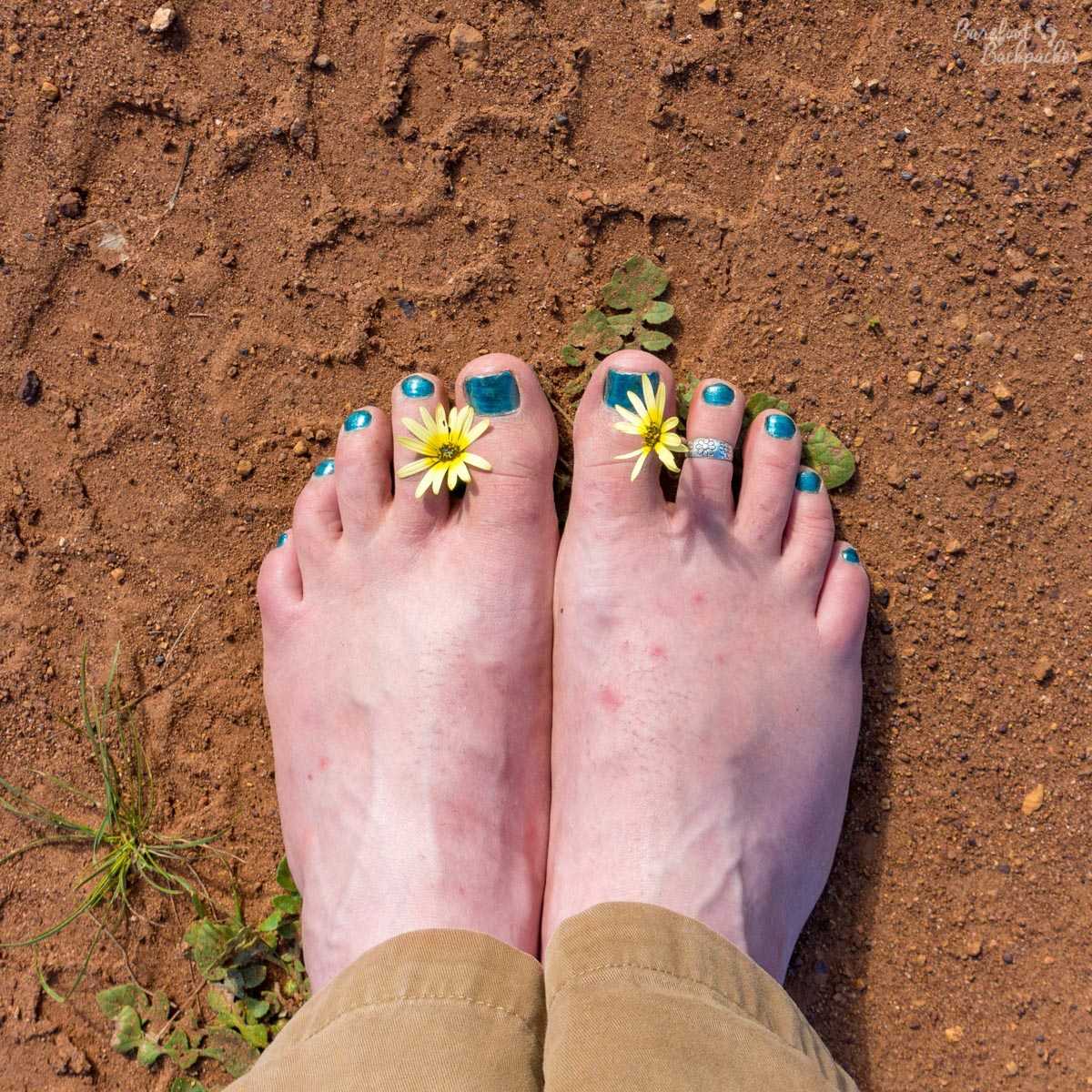
Toenail varnish, as painted by a friend in Australia.
The same could be said for my preference for having long hair, since in many cultures, ‘men’ should keep their heir either short, or bundled up in a certain and specific way. Having hair that flaps about, or even in a pony-tail, tends to lead people down certain assumptions. And I’m not obviously into my 80s rock music.
How can asexuals deflect assumptions while travelling?
To answer questions to people’s cultural satisfactions, there’s a couple of things I do. The trickiest is the toenail varnish, which I try to explain best by saying if I have to show my toes off, they might as well be blingy since they’re otherwise pretty ugly things.
To answer questions about my lack of partner, I will often invent something – that I have a wife but she has an important job, or is looking after the children, that sort of thing. The follow-up question is ‘how can you be away for so long?’, to which I often try to make a joke of. Something like ‘wouldn’t you want to spend two months away from your wife and kids if you could?’. Alloromantic humour doesn’t come naturally to me, as you can tell.
What I also to do back this up is to have to hand a picture of a female friend. The very first picture, chronologically, on my camera’s memory card is usually a picture of one of my friends. Being the first picture makes it easy to access, it’s usually visible just by pressing one button. This means I can easily and quickly show people a picture of her and claim that she’s my girlfriend or wife or whatever.
It’s similar in a way to tales I hear of (female) solo travellers in places like North Africa and India who are constantly asked about a husband. These female solo travellers will often whip out a photo of a male friend and say ‘he’s at home, busy, looking after the children and working’ or some combination of those excuses, and in a way it’s weird to think that I would do the same thing.
Can asexuals have holiday romances?
Asexuals can of course have holiday romances, just like other travellers whether Queer or not. We’re less likely to do so, but that doesn’t mean we can’t, or don’t.
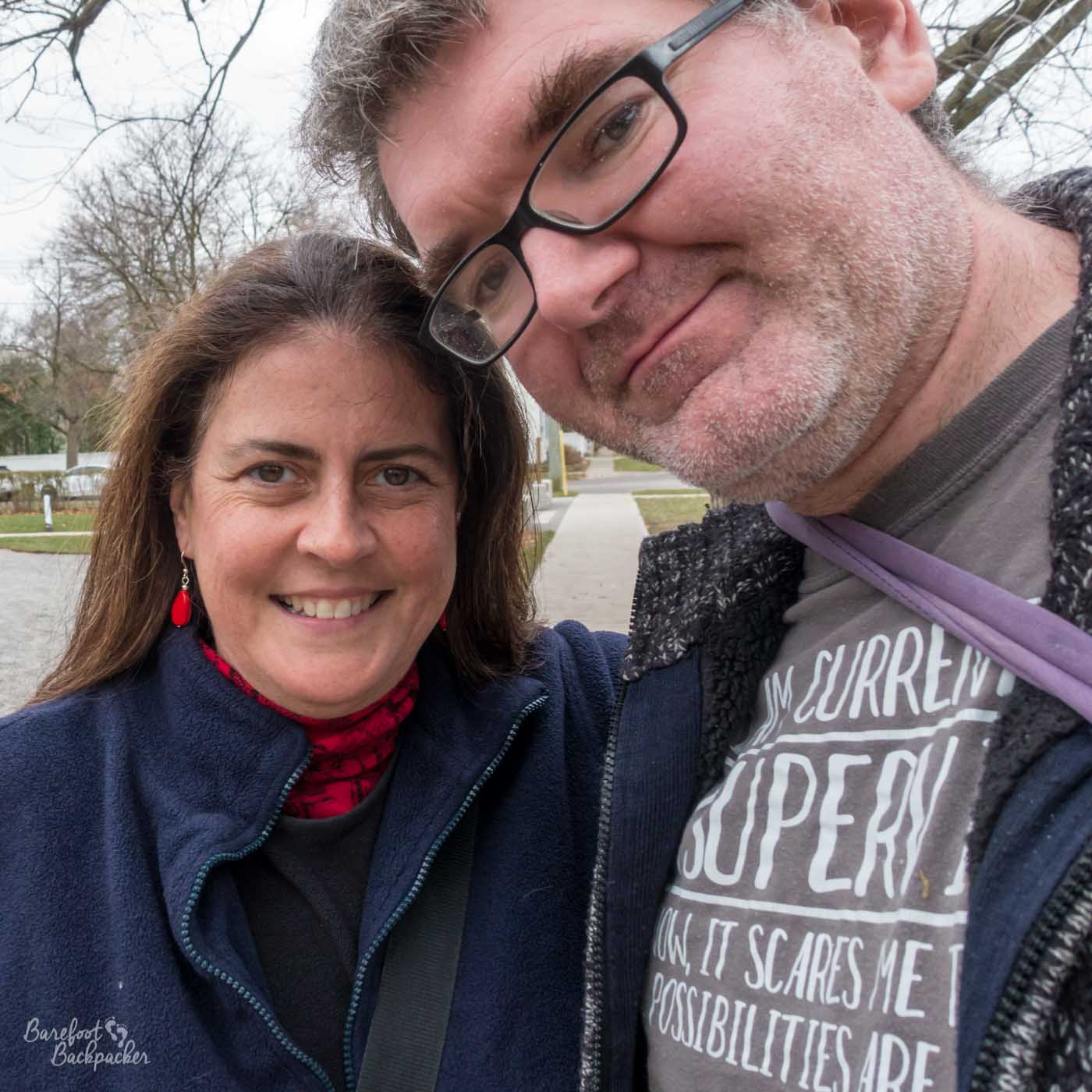
Me and my travel friend Vicky, who, er, yes.
That said, I can only speak for me, and it’s not something I tend to do. But I never have, again more because I’m an introvert than an asexual. That said, because I’m less sexual than my peers, I never went to those kinds of party party destinations when I was younger, those places that generally exist to encourage people to drink, dance, drug, and ‘do the do’. Especially ‘Queer’ destinations, as I wrote about earlier. They simply interested me less than somewhere with a bit of culture and fewer societal peer pressures.
That doesn’t mean I haven’t travelled with affairs of the flesh in mind. I’ve ‘dated’ people in different countries (indeed, different continents) before now. However because I’ve always had penpals and online friends abroad, there’s been very little difference in practice between me travelling to meet them, and me just travelling to meet a foreign friend. In addition, in my travels, I have explored my kinky side, mainly involving meeting random men for tickle and bondage play. But that’s never been the reason why I travel to places; it’s always been something I’ve looked up once I’ve got there, and conceptually aside, most of my travels have been entirely vanilla.
Is it easy for asexuals to meet people when travelling?
Because being asexual means there’s no sexual subtext when I chat with people, it makes it easier to talk to people in places like backpacker hostels, especially women. Obviously only if they speak to me first – regardless of sexuality, my introversion is by far and away the most important aspect of the way I travel – and to be honest, if I were an early 20-something woman, I’d be somewhat fazed if a weird middle-aged bloke started talking to me first. But that I give over asexual, or at least possibly gay, vibes, means people seem more comfortable talking to me and hanging around me.
Also, remember that in general, I’m not saying asexuals don’t go out and meet people etc. We do it the same way everyone else does, just without the hope or expectation of getting something out of it other than companionship. We still go to hostels, bars, walking tours, on group trips, etc. Asexual doesn’t mean isolationist any more than ‘solo traveller’ means isolationist – and despite their common theme there’s no connection between the two. Also, as an asexual I’ve no objection to travelling with someone (regardless of sexuality, gender, personal identity etc). As a solo traveller I’d rather be on my own but if necessary I’ll tag along with another traveller if it makes it easier. I’ve certainly done this many times when I’ve wanted to go to places hard to get to on my own – for example, the Aral Sea, which I visited having found someone on one of the online travel forums.
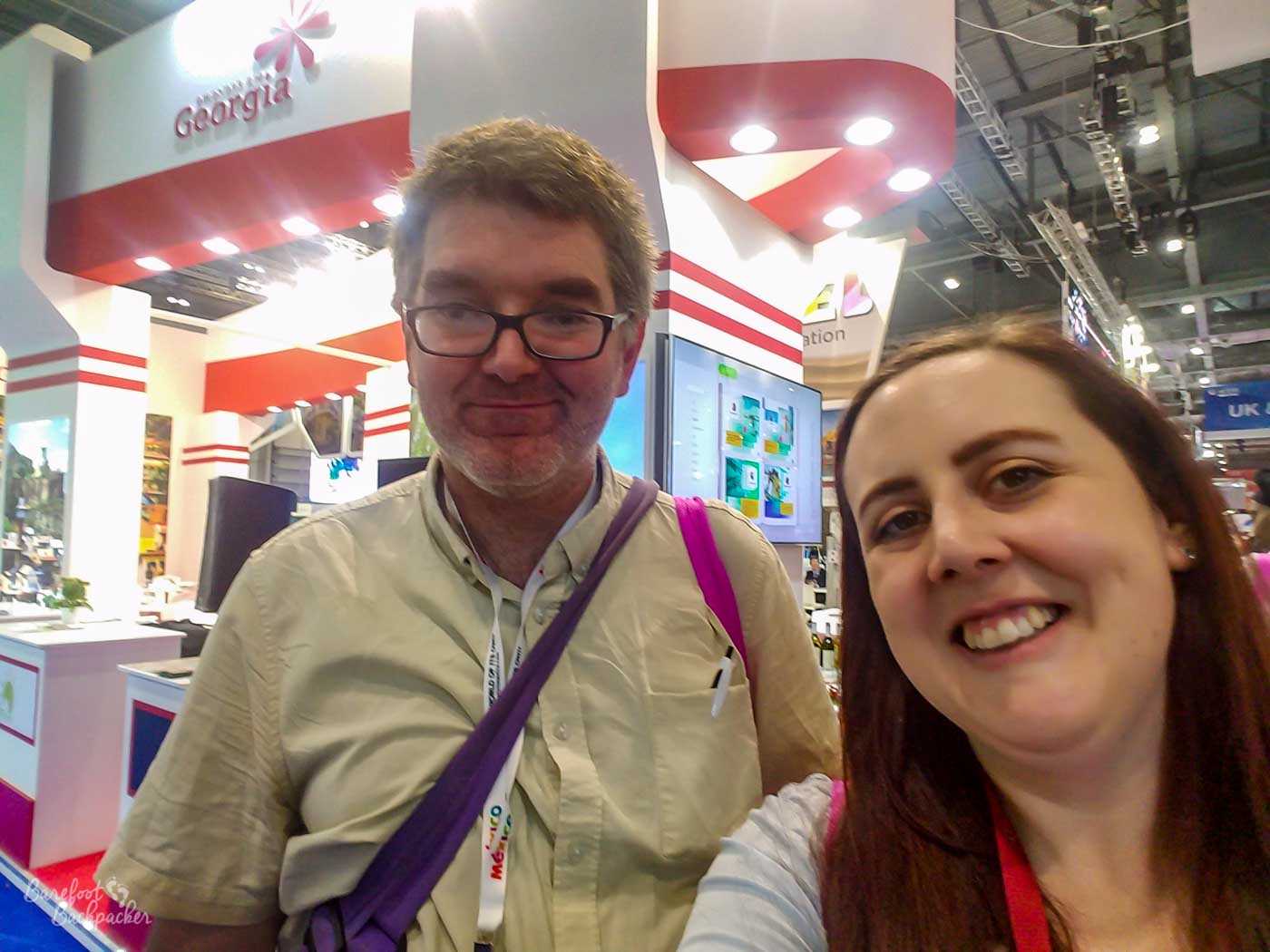
Me and my friend Kate-Frankie at the World Travel Market in London.
There’s also no expectation to keep in touch afterwards, with the hope of anything developing. I mean sure it’s always lovely to get more friends, especially those with whom I share a love of travel. But the likelihood of meeting up again is low, so if we’re only friends for the duration of the trip, that’s fine.
Conclusion
While not as dangerous as other aspects of Queer travel, asexual travel isn’t without its problems and concerns. Most of these are cultural aspects relating to how little asexuality is both known and marketed. In both cases we simply don’t exist and very little is geared to people like me – most people see us as ‘weird solo travellers’.
That said, while open legislation against asexuality is unlikely to pass, we still have more to fear than heterosexual travellers, because we are actively ‘different’. Our existence is still very much against many culture’s ‘norms’. Even if we (I?) can ‘pass’ as cishetallo without much effort, we shouldn’t need to ‘hide’ ourselves in the first place. Especially if that being hidden isn’t often even our choice.